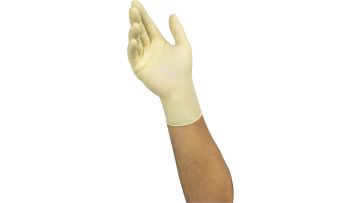What are Disposable Gloves Used for?
Disposable gloves may be worn for the protection of the hands against a full range of hazardous chemicals, biological materials, and sharp items. They are regularly used in medical environments for the prevention of direct contact and cross-contamination between staff and patients.
Disposable gloves are also regularly purchased for protection when undertaking cleaning tasks. Likewise, they are worn for the prevention of contamination when carrying out food handling duties. Additional industrial applications include agriculture, marine environments, baby care, beauty and manufacturing. Disposable gloves are commonly subject to rigorous testing and are supplied with the assurance of having met key safety and quality standards.
Thick gloves are recommended for protection against potentially harmful chemicals and mechanical damage. However, you should be aware that they will have a poorer grip and may not offer the same level of flexibility as other types of gloves.
Which Disposable Gloves Should I Be Using?
There is a variety of factors that should be considered in the choice of disposable gloves, as highlighted in the following table:
Types of Disposable Gloves
There are distinct benefits and applications associated with the use of different types of gloves. You must choose disposable gloves that are best suited to your intended purposes. There should be some consideration of factors such as the fit, level of protection, and risk of allergic reactions.
Latex Disposable Gloves

Natural latex gloves provide outstanding levels of performance and comfort. Unfortunately, contact with latex causes some people to experience allergic reactions, but despite this, they remain the preferred choice for many people within the industrial, medical, and food industries. Being biodegradable, latex disposable gloves are also an environmentally conscious choice.
Nitrile Disposable Gloves

Nitrile disposable gloves are the recommended choice for use in oily environments where high levels of strength, puncture resistance, and durability are required. The material strength more than makes up for the lack of flexibility in comparison with latex gloves. They are also the ideal choice for people who suffer from latex allergies. Nitrile gloves are used across a range of mechanical and industrial applications.
Vinyl Disposable Gloves

Gloves made from vinyl are the most affordable choice. However, vinyl isn’t nearly as elastic as either latex or nitrile. Having said that, vinyl gloves are ideally suited to short tasks where the users are willing to sacrifice some degree of comfort. They offer a good level of protection against contamination but are not as suitable as other gloves for jobs involving exposure to dangerous or hazardous materials. Vinyl gloves are ideal for work in the food, beauty, and hair industries.
How to Measure Glove Size
The process of how to measure glove size requires the use of a flexible tape measure. In order to correctly identify your glove size, you will need to measure the circumference of your dominant hand, across the palm and directly behind the knuckles. The thumb shouldn’t be included in the measurement. The number of inches recorded in the measurement should correspond with the size of the glove. As an example, a size 8 glove should be selected on taking an 8-inch measurement.
.jpg)




.jpg)